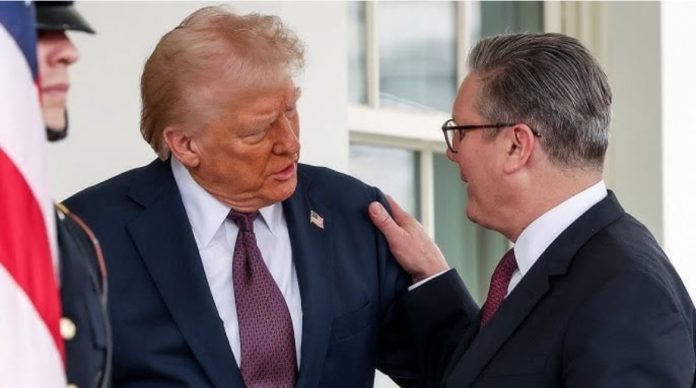A Nobel Prize-winning economist has delivered a damning verdict on the UK’s recently announced trade deal with the United States, describing it as politically driven and economically flimsy. The agreement, unveiled with considerable fanfare by Prime Minister Keir Starmer and US President Donald Trump during a live, televised phone call, has been billed as a “first-of-its-kind” accord that will safeguard thousands of British jobs. However, Joseph Stiglitz, one of the world’s foremost economists, has dismissed the deal as little more than a symbolic gesture.
Stiglitz said, “Any agreement with Trump isn’t worth the paper it’s written on.” Citing Trump’s erratic trade history, Stiglitz recalled how the president signed deals with Canada and Mexico in his first term, only to impose tariffs on them shortly after retaking office. “I would view it as playing into Trump’s strategy,” he said. “His strategy is divide and conquer—go after the weakest countries and sort of put the stronger countries in the back.”
A Fragile Deal in Volatile Times
The UK-US trade agreement comes in the wake of Trump’s controversial “Liberation Day” declaration, which saw the US unilaterally raise tariffs on several nations, sparking widespread instability in global markets. China was hit with initial tariffs of 34%, prompting swift retaliation and ushering in a new chapter of trade war. Currently, both nations have tariffs exceeding 100% on each other’s goods.
Despite these tensions, high-stakes negotiations between the US and China are now underway. According to Stiglitz, Beijing has emerged in a position of strength, demonstrating the United States’ deep reliance on Chinese imports and manufacturing. “They made it very clear that the US is very dependent on China in so many ways,” he said.
Economic Analysis: Gains or Illusions?
From an economic perspective, the practical benefits of the UK-US agreement appear modest. The deal includes reduced tariffs on British car and steel exports to the US, which the government claims will support UK industry. In return, Britain has agreed to eliminate a tariff on ethanol—a key ingredient in beer production—imported from the US. Additionally, American farmers will gain access to the UK agricultural market for the first time, though the government insists domestic food standards will remain unchanged.
Yet these concessions raise concerns. The UK’s removal of tariffs on ethanol may marginally reduce costs for beer production, but it also exposes domestic producers to competition from US ethanol producers, whose scale and subsidies may outmatch British suppliers. The steel and automotive sectors stand to benefit, but the gains may be short-lived if Trump revisits tariffs unpredictably, as he has done before.
Moreover, increased agricultural imports from the US, even with existing food standards in place, could apply pressure on UK farmers already grappling with post-Brexit market disruptions and rising costs. Stiglitz’s warning suggests that what appears to be a “win” on paper may quickly turn into a liability if Trump’s administration decides to reverse course.
Political Theatre and Strategic Missteps
The live televised nature of the agreement’s announcement, complete with mutual praise and political theatre, underscores what critics see as an effort to showcase leadership strength rather than a well-calculated economic strategy. “If it turns out, in the end, Trump is unhappy, he’ll run,” Stiglitz cautioned. “If he’s unhappy, I pray for you.”
This statement speaks volumes about how international trade, once a domain governed largely by multilateral rules and economic logic, has increasingly become a tool of political manipulation. By bypassing more stable partnerships, such as with the European Union, in favour of bilateral deals with volatile partners, governments may prioritise short-term political optics over long-term economic resilience.
Stiglitz believes the UK should have focused its efforts on restoring and strengthening trade relations with the EU post-Brexit. “If you had worked with the EU to get a good deal, you could have done better than what you’ve done,” he said. His assessment suggests that aligning with the world’s largest trading bloc would have offered greater consistency and negotiating power than striking a deal with a US administration known for its unpredictability.
In the final analysis, the UK-US trade deal appears to be less about securing long-term economic prosperity and more about political symbolism. While the government heralds it as a triumph for British jobs and industry, experts like Joseph Stiglitz caution that such deals are fraught with risk when driven by leaders with shifting loyalties and self-serving strategies.
As the UK charts its path in a post-Brexit world, this agreement may come to represent a lesson in the perils of political expediency—and a reminder that, in global trade, stability often trumps spectacle.







